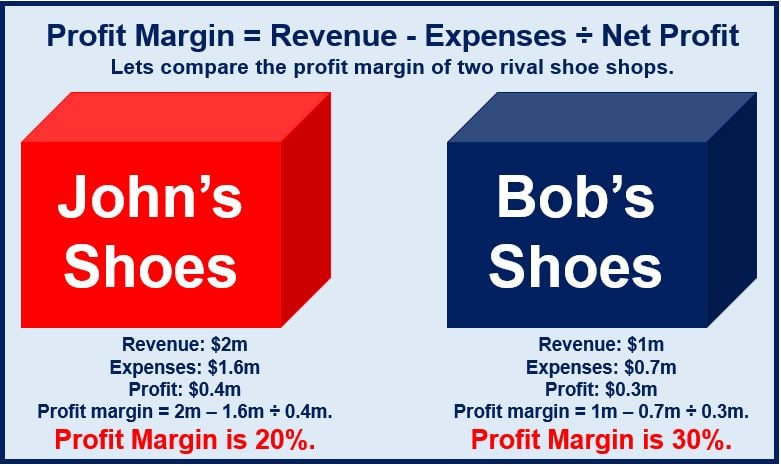Profit margin, also known as net margin, net profit margin, or net profit ratio, is the net profit as a percentage of net revenue – the percentage of selling price that turned into profit, i.e. the amount by which revenue from sales exceeds a business’ costs. Put simply, it is a measure of a business’ profitability.
Just profit margin differs from after-tax profit margin (total revenue remaining after all tax payments, dividend payments, interest and expenses are deducted from sales).
It calculates how every dollar of sales a company makes is represented in earnings. It is calculated by dividing net profit by net revenue.
 Even though John’s Shoes has higher sales, most investors would see Bob’s shoes as a better investment, because its profit margin is greater.
Even though John’s Shoes has higher sales, most investors would see Bob’s shoes as a better investment, because its profit margin is greater.
According to Cambridge Dictionaries Online, profit margin is:
“The difference between the total cost of making and selling something and the price it is sold for.”
Profit margin is a tool used to discover the pricing strategies of a company and how efficiently it controls its costs. It reveals the amount of surplus generated per unit of a product or service sold. When refering to a gradual reduction in gross profits over time, we use the term margin erosion.
For a company to report a good profit margin, it has to operate efficiently in order to recover the costs of the products it sells, operating expenses, and debt.
As profit margin is represented as a percentage, a 10% profit margin would mean that a company has a net income of $0.10 for every dollar of sales.
Assume a company reports net income of $50 million from sales of $100 million, giving it a profit margin of 50% ($50 million/$100 million). If net income for the company increases a year later to $60 million on sales of $400 million, its profit margin would actually drop to 15% ($60/400). In this case, even though the company reported an increase in sales, its profit margin declined.
Other similar measures that businesses sometimes use include:
– Gross profit margin – gross profit (the amount of money after sales) divided by net sales.
– Net profit margin – net profit (profit after accounting for costs such as operating costs, interest payments, and taxes) divided by net sales.
The word ‘margin’ is widely used in business and finance. Basically, it means the difference between one price/cost and another price, usually related to how much money the trader or speculator can make.
